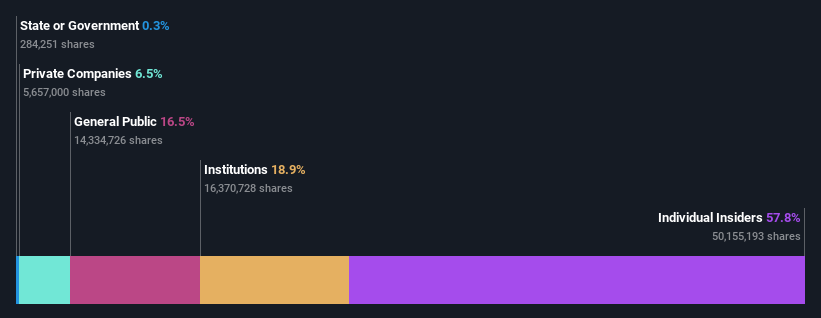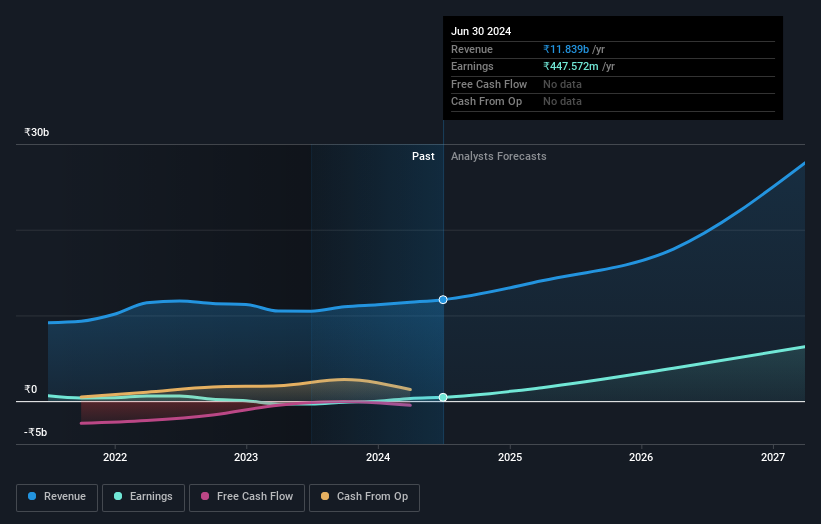Shilpa Medicare Limited's (NSE:SHILPAMED) insiders are still the largest shareholders with 58% stake despite recent sales

Key Insights
- Insiders appear to have a vested interest in Shilpa Medicare's growth, as seen by their sizeable ownership
- The top 13 shareholders own 51% of the company
- Insiders have sold recently
To get a sense of who is truly in control of Shilpa Medicare Limited (NSE:SHILPAMED), it is important to understand the ownership structure of the business. The group holding the most number of shares in the company, around 58% to be precise, is individual insiders. That is, the group stands to benefit the most if the stock rises (or lose the most if there is a downturn).
Insiders own the top position in the company’s share registry despite recent sales and as a result, were the biggest beneficiaries of last week’s 6.9% gain.
Let's delve deeper into each type of owner of Shilpa Medicare, beginning with the chart below.
See our latest analysis for Shilpa Medicare

What Does The Institutional Ownership Tell Us About Shilpa Medicare?
Many institutions measure their performance against an index that approximates the local market. So they usually pay more attention to companies that are included in major indices.
Shilpa Medicare already has institutions on the share registry. Indeed, they own a respectable stake in the company. This can indicate that the company has a certain degree of credibility in the investment community. However, it is best to be wary of relying on the supposed validation that comes with institutional investors. They too, get it wrong sometimes. It is not uncommon to see a big share price drop if two large institutional investors try to sell out of a stock at the same time. So it is worth checking the past earnings trajectory of Shilpa Medicare, (below). Of course, keep in mind that there are other factors to consider, too.

Hedge funds don't have many shares in Shilpa Medicare. Looking at our data, we can see that the largest shareholder is the CEO Vishnukanth Bhutada with 8.9% of shares outstanding. Dharmavati Bhutada is the second largest shareholder owning 7.2% of common stock, and Ravi Inani holds about 4.6% of the company stock.
Looking at the shareholder registry, we can see that 51% of the ownership is controlled by the top 13 shareholders, meaning that no single shareholder has a majority interest in the ownership.
Researching institutional ownership is a good way to gauge and filter a stock's expected performance. The same can be achieved by studying analyst sentiments. There is some analyst coverage of the stock, but it could still become more well known, with time.
Insider Ownership Of Shilpa Medicare
The definition of an insider can differ slightly between different countries, but members of the board of directors always count. The company management answer to the board and the latter should represent the interests of shareholders. Notably, sometimes top-level managers are on the board themselves.
I generally consider insider ownership to be a good thing. However, on some occasions it makes it more difficult for other shareholders to hold the board accountable for decisions.
Our most recent data indicates that insiders own the majority of Shilpa Medicare Limited. This means they can collectively make decisions for the company. Given it has a market cap of ₹75b, that means they have ₹43b worth of shares. It is good to see this level of investment. You can check here to see if those insiders have been buying recently.
General Public Ownership
With a 17% ownership, the general public, mostly comprising of individual investors, have some degree of sway over Shilpa Medicare. While this group can't necessarily call the shots, it can certainly have a real influence on how the company is run.
Private Company Ownership
We can see that Private Companies own 6.5%, of the shares on issue. Private companies may be related parties. Sometimes insiders have an interest in a public company through a holding in a private company, rather than in their own capacity as an individual. While it's hard to draw any broad stroke conclusions, it is worth noting as an area for further research.
Next Steps:
I find it very interesting to look at who exactly owns a company. But to truly gain insight, we need to consider other information, too. Be aware that Shilpa Medicare is showing 2 warning signs in our investment analysis , and 1 of those doesn't sit too well with us...
If you would prefer discover what analysts are predicting in terms of future growth, do not miss this free report on analyst forecasts.
NB: Figures in this article are calculated using data from the last twelve months, which refer to the 12-month period ending on the last date of the month the financial statement is dated. This may not be consistent with full year annual report figures.
New: Manage All Your Stock Portfolios in One Place
We've created the ultimate portfolio companion for stock investors, and it's free.
• Connect an unlimited number of Portfolios and see your total in one currency
• Be alerted to new Warning Signs or Risks via email or mobile
• Track the Fair Value of your stocks
Have feedback on this article? Concerned about the content? Get in touch with us directly. Alternatively, email editorial-team (at) simplywallst.com.
This article by Simply Wall St is general in nature. We provide commentary based on historical data and analyst forecasts only using an unbiased methodology and our articles are not intended to be financial advice. It does not constitute a recommendation to buy or sell any stock, and does not take account of your objectives, or your financial situation. We aim to bring you long-term focused analysis driven by fundamental data. Note that our analysis may not factor in the latest price-sensitive company announcements or qualitative material. Simply Wall St has no position in any stocks mentioned.
About NSEI:SHILPAMED
Shilpa Medicare
Manufactures and sells active pharmaceutical ingredients (APIs), finished dosage formulations, biosimilars, recombinant albumin in India, the United States, Europe, and internationally.
High growth potential with adequate balance sheet.
Market Insights
Community Narratives




